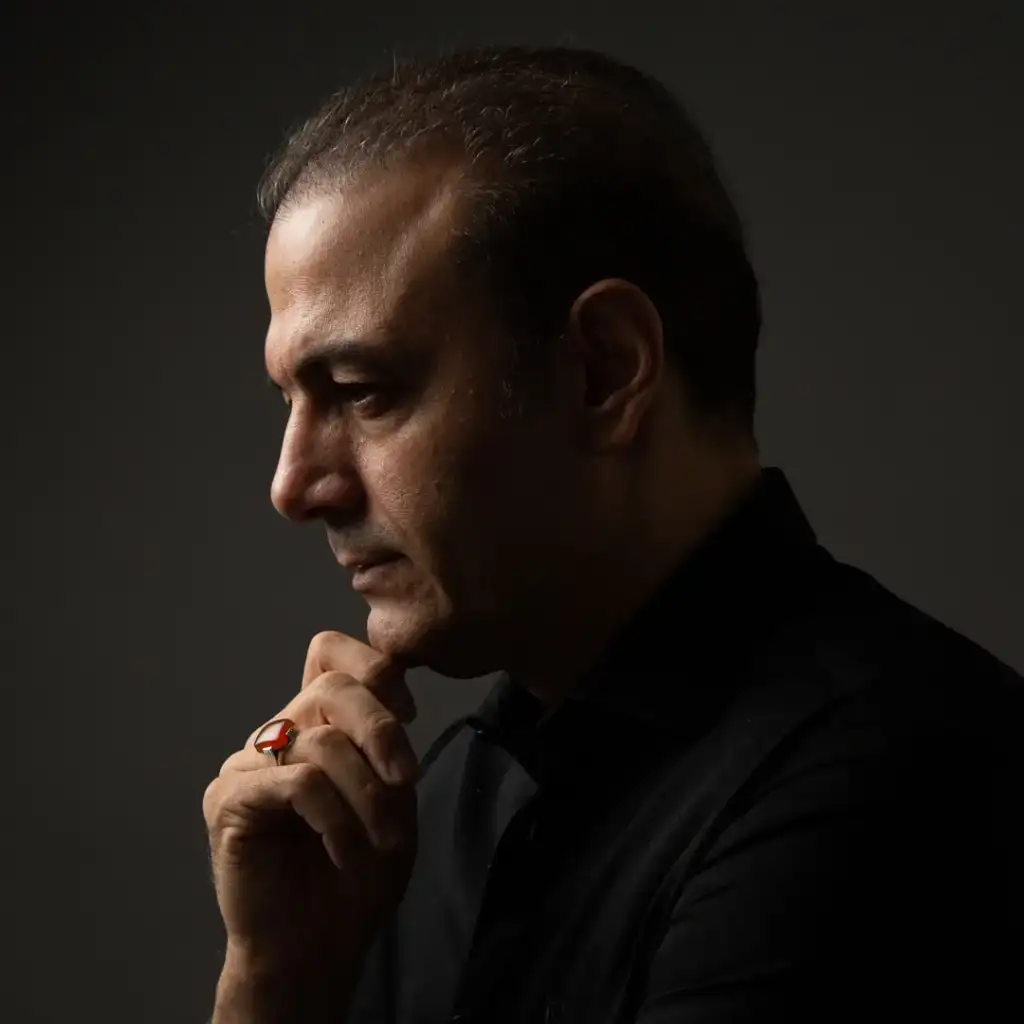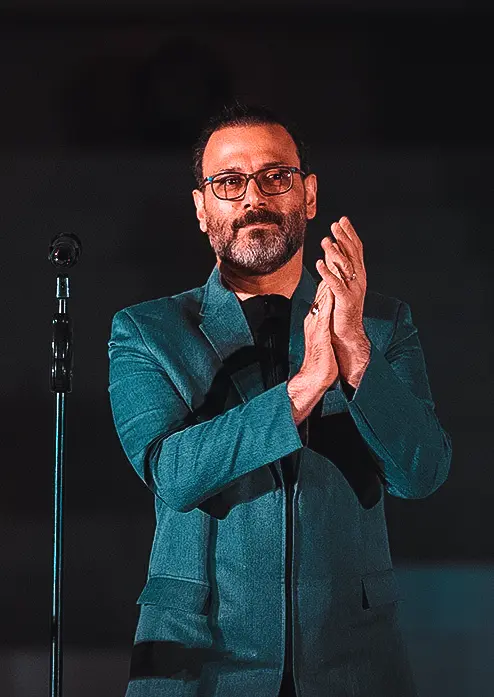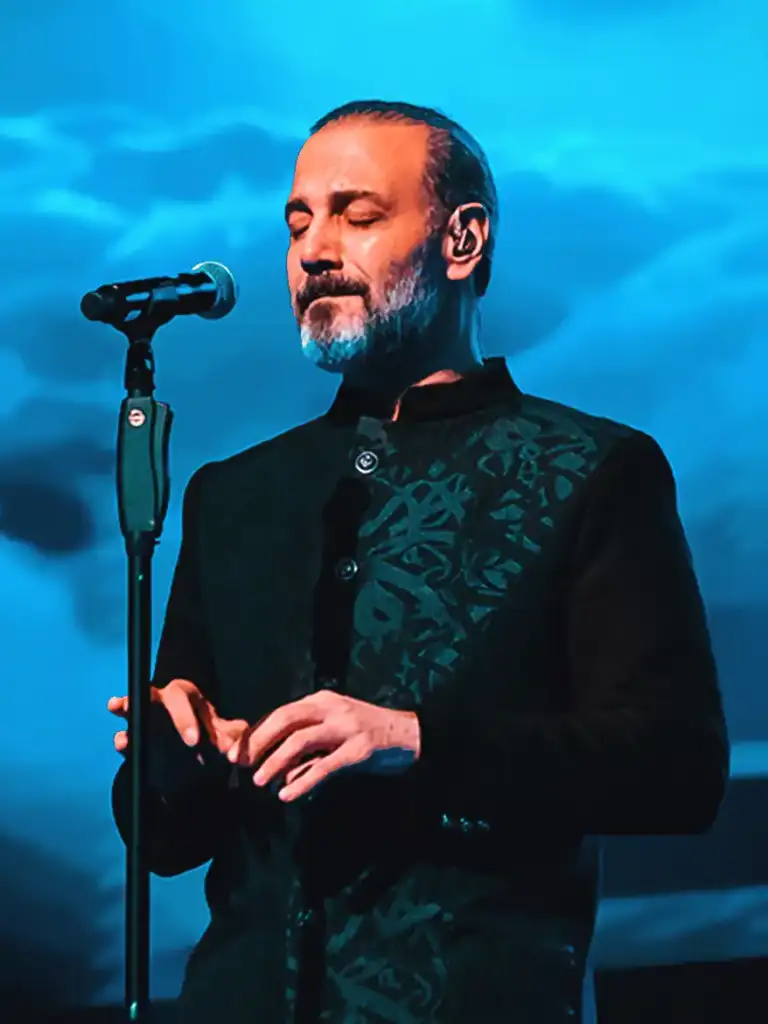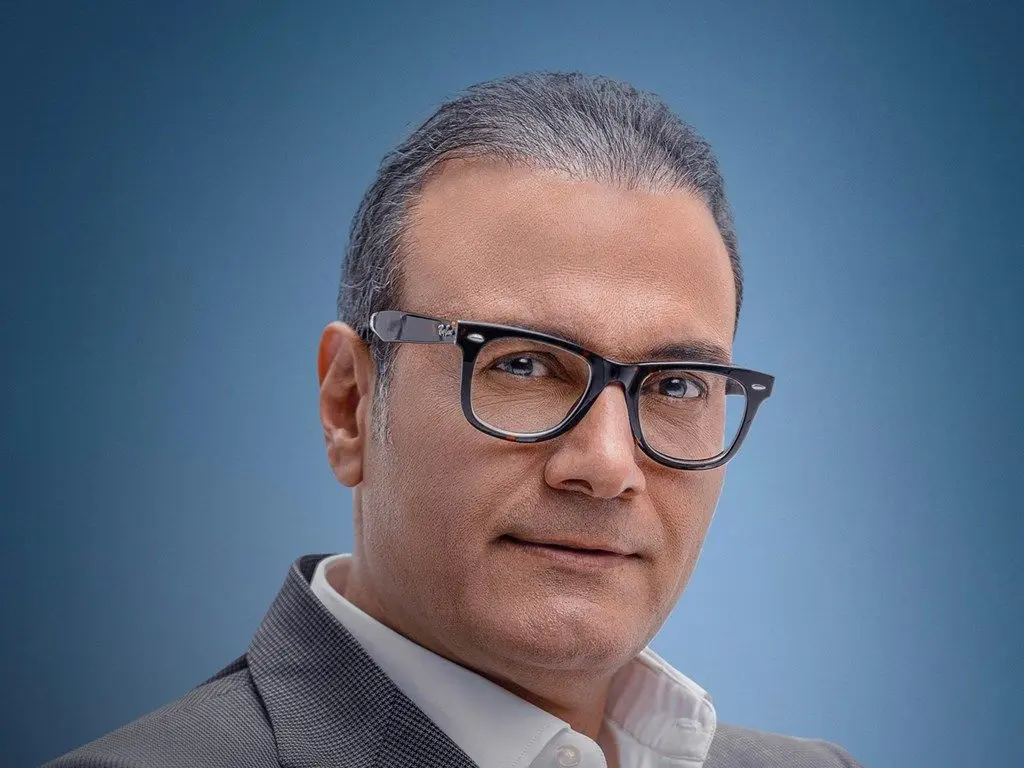
Alireza Ghorbani
In the diverse panorama of Iranian music, Alireza Ghorbani stands as a towering figure, known for his deep-rooted ties to the Persian classical tradition and his ability to ench Ghorbani’s appeal reaches beyond Iran’s borders. He learned to recite the Qur’an as a child and later mastered Middle Eastern music scales. His path from singing solo for Iran’s National Orchestra to becoming a respected artist shows his vocal skill and his dedication to keeping Persian song alive while helping it grow. He has worked with artists from other countries and joined in projects that mix cultures. This has shown off his wide-ranging talent and helped bring different cultures closer. Now, people know his name at festivals all over the world.
Alireza Ghorbani’s music catalog, which includes 19 albums released in Iran and Europe, along with his key roles in international music projects, shows his position as a cultural representative of Iranian music.
His involvement in famous festivals and shows at top venues worldwide proves he’s one of today’s most dynamic traditional singers. Also, as an artist who’s dealt with the tricky parts of Iran’s music world, Ghorbani’s career shows toughness against a backdrop of cultural and rule-based hurdles mirroring the strong spirit of Iranian art.
Early Life and Musical Beginnings
Introduction to Ghorbani’s Early Life

Alireza Ghorbani started his music career during the Iranian revolution, a time of unrest and confusion. When he was seven, people noticed his skill in reciting the Qu’ran. The chaos around him didn’t stop Ghorbani from loving music. He decided to sing as a teenager. By his twenties, Ghorbani had become a soloist for the National Orchestra of Iran. This showed his skill with hard singing methods and made him a key figure in Persian classical music.
Impact of Traditional Persian Music
Traditional Iranian music has a deep connection to the country’s history and culture. It has had a strong impact on Ghorbani’s musical identity. This style of music changed a lot after Islam came to Iran. It relies on improvisation and composition using a set of modal scales and tunes. Ghorbani’s early contact with this music tradition, along with the Golha radio shows that played the best Persian songs and poems, built the base for his strong tie to Iranian classical music.
First Music and Vocal Lessons
Ghorbani started his music career with Qu’ran recitations then began vocal lessons at age 12. He learned from several teachers, including big names like Farhad Fakhreddini and Hossein Omoumi, who taught him Persian vocal music. These mentors helped him learn the basics, skills, and methods of Iranian classical singing. His training covered traditional Persian music and also sparked his interest in other cultures. This mix of strict training and cultural awareness made him a flexible artist allowing him to master many Middle Eastern music scales and become a key figure in Persian song.
Rise to Fame

Alireza Ghorbani’s climb to the top of Persian music shows his rare skill and hard work. He started as a young singer of the Qur’an and grew into a star of Iranian music. His path has many big moments and team-ups that have made him a top singer.
From local name to country-wide star
Ghorbani’s musical journey began with Qur’an recitations and grew to include traditional Iranian music under the guidance of respected teachers like Khosro Soltani and Hossein Omoumi. This early exposure helped shape his musical career. His love for poetry and music collections during his younger years pushed him to learn the many scales of Middle Eastern music. By his twenties, he had become a solo singer with the National Orchestra of Iran.
Key performances and collaborations

Alireza Ghorbani’s career path shows his range and deep roots in Persian music. Since 1999, he has sung for the National Iranian Orchestra. He also takes part in concerts and festivals in Iran and abroad, which has an impact on the music world. The “Alireza Ghorbani & Baran Ensemble Concert Album” brings together Ghorbani’s heartfelt singing and the Baran Ensemble’s lively instruments to capture the heart of Persian music. Also, his shows at well-known places and events, like the Mawazine Festival and Respect Festival, have not just wowed crowds but also shown how well he knows the music business.
Becoming a solo vocalist for the National Orchestra
Ghorbani’s new job as a solo vocalist for the National Orchestra of Iran at 27 was a big step in his career. This role gave him a chance to explore and show off the radif and tasnif, using rare vocal methods that have made him stand out as a top singer of Persian songs. He knows a lot of songs and is good at Middle Eastern music scales, which makes people see him as a worthy follow-up to Mohammed Reza Shajarian, the best Persian classical singer ever.
Musical Style and Influence
Characteristics of Ghorbani’s music
Alireza Ghorbani’s music blends the complex patterns of Iranian traditional instruments such as the Tar, Setar, and Santur. His songs, which have their roots in Persian culture, showcase intricate rhythms heartfelt melodies, and expressive vocals that take listeners to the core of Iran’s musical past. Ghorbani’s compositions show the diversity and charm of Iranian folk music. This makes him a key figure in keeping Persian culture alive and representing it through his resonant voice and sophisticated instrumental work.
Influences from classic and contemporary artists
The sounds of traditional Iranian music and Quran recitations had an influence on Ghorbani from an early age. Mentors like Khosro Soltani, Behrooz Abedini, and Farhad Fakhreddini shaped his musical path opening up new possibilities in Iranian music for him. His exposure to classical Persian poets and modern writers added depth to his foundation. This allowed him to create songs about human morality, love, nature, and respect for others. Ghorbani’s music also honors the giants of modern Iranian poetry showing how he can combine old and new elements.
Contribution to Persian traditional music
Alireza Ghorbani stands out as an expert in Iranian folk music, with a major influence on the genre. He works hard to keep the old roots of Iranian Folk music alive, which has won him many fans in Iran and other countries. When Ghorbani performs, either with small groups or the National Orchestra of Iran, he shows how well he knows the radif and tasnif. This proves he’s a top singer of traditional Iranian music today. Ghorbani’s music keeps giving new Iranian musicians something to look up to. He sticks to the old ways of his family and shines a light on Persian culture.
Notable Works and Performances

Alireza Ghorbani’s music career has an impact on listeners worldwide through his remarkable compositions and shows. His records, concerts, and teamwork with fellow musicians highlight his adaptability and strong ties to Persian music heritage.
Hit albums and songs
Ghorbani’s music career boasts a diverse album collection that covers various themes and styles. “The Voices and Bridges” shines as a recent standout mixing old and new music to create a one-of-a-kind listening experience. His tracks like “Leyla,” “Khiale Khosh,” and “Eshgh Asan Nadarad” show his talent for telling deep emotional stories through song. Every album and song proves Ghorbani’s expertise in radif and tasnif displaying his command over the most uncommon vocal methods in Persian singing.
Significant live performances
Ghorbani has performed on many top stages around the world showing he’s popular . Some of his standout shows include “A Persian Night” with the Vancouver Opera Orchestra in Canada. There, he sang as the main voice for the world premieres of “Hame Iranam” and “Resurrection”. He also takes part in international festivals, like the Mawazine Festival and Respect Festival. This proves he’s a global ambassador for music. These performances show off his amazing singing skills and his dedication to bringing Persian music to people all over the world.
Collaborations with other artists
Collaboration plays a key role in Ghorbani’s career. It gives him a chance to study and mix different musical traditions. He teams up with many different artists. These include Alim Qasimov, Jobran Trio, Dorsaf Hamdani, and Bombay Jayashri, to name a few. These team-ups create a rich blend of music that crosses cultural lines. You can see this in projects like “The Voices and Bridges.” This project brings together languages and music from all over the world. Through these partnerships, Ghorbani grows his music skills. He also helps more people understand and enjoy Persian music worldwide.
Ghorbani’s Role in International Music Projects
Taking Part in Music Projects from Different Cultures
Alireza Ghorbani shows his range and dedication to sharing cultures by taking part in many cross-cultural music projects. His work on projects like Le Rhythm de la Parole and SOUFFLES DU MONDE in Iran, France, India, and Mali highlights how he connects Persian music with world traditions. These projects prove Ghorbani’s great skill and his aim to build understanding between cultures through music. He works with artists from many backgrounds, including Tunisian singer Dorsaf Hamdani, and performs with well-known orchestras like the Düsseldorf Symphony Orchestra and the Vancouver Opera Orchestra. This shows his worldwide appeal and impact.
Helping Create Worldwide and Blended Music Records
Ghorbani has had an influence on bringing Persian music to more listeners through his work on global and fusion music albums. The album The Voices and Bridges, which Ehsan Matoori wrote with Ghorbani as the main singer, shows this effort. It has a mix of songs in different languages like Persian, Spanish, Arabic, and English proving that music can cross cultural and language lines.
Ghorbani’s work with artists such as Bombay Jayashri and Celia Woodsmith on this album, and his skill to mix traditional Iranian instruments with other musical styles from around the world, have made the world music genre richer. This project, along with others like the fusion song that came out in August, has gotten a good response from music fans all over the world. This shows how much Ghorbani has changed the fusion music scene.
How Music Helps Cross Cultural Divides
Alireza Ghorbani’s music projects have an important impact on closing cultural divides and boosting understanding among different audiences. His work on The Voices and Bridges project, which unites languages and musical traditions from across the globe, shows how music can appeal to everyone. The project aims to combine poetic and musical arts from different cultures.
This has shown Ghorbani’s range as an artist and proven that music can bring people together despite where they’re from or what culture they belong to. Ghorbani has worked with artists from many backgrounds and performed at music festivals all over the world. This has made him a cultural ambassador. He uses his deep voice and moving lyrics to give people hope and make them appreciate Persian music and its rich history more.
Challenges and Controversies
Making your way through Iran’s music scene

Alireza Ghorbani’s path through Iran’s music scene shows a mix of different experiences. He learned from many teachers, each adding to his skills as an artist. His teachers, like Farhad Fakhreddini and Hossein Omoumi, played a key role to help him understand and excel in Persian vocal music. But this path wasn’t easy. In Iran, music ties to culture and rules making it hard for artists to work. What Ghorbani went through shows a bigger issue many Iranian artists face. They must balance old teachings with new needs in the music world.
Controversies surrounding traditional and modern musical fusion
Ghorbani’s method of combining traditional Iranian instruments with new compositions has started debates within the music world. This mix of traditional and modern elements walks a fine line trying to respect the deep roots of Persian music while also welcoming new ideas and worldwide music trends. Money issues that limit the use of Iranian musicians and instruments make this task even harder, as it calls for careful picking and blending of elements to keep the real feel and heart of Persian music traditions.
Overcoming cultural and political barriers
The music isn’t the only challenge. Cultural and political obstacles also stand in the way. Ghorbani’s experience shows the red tape in Iran. He couldn’t get concert permits because his group had women musicians. This points to the rules that hold artists back in Iran. Also, his attempts to perform worldwide have run into problems. U.S. rules have blocked him. This shows how hard it is for Iranian musicians to make a name for themselves when countries are at odds. These roadblocks don’t just affect Ghorbani. They show the wider issues Iranian artists face as they try to share their culture with the world.
Alireza Ghorbani’s career shows the grit and imagination needed to succeed despite these hurdles and disputes. His commitment to Persian music, along with his fresh take on blending styles and working with others, highlights how art can bridge cultures and foster understanding.
Conclusion
As we’ve looked at Alireza Ghorbani’s impressive career, we’ve seen his journey from his early years steeped in Persian musical traditions to his rise as a respected figure worldwide. His strong dedication to Iranian cultural heritage, along with his drive to collaborate , has boosted his role as a musical ambassador and highlighted how he bridges cultural gaps through music’s universal language. Ghorbani’s tale shows how music can cross geographical, cultural, and political lines helping Persian classical music to reach and touch people all over the world.
His impact goes beyond just performing. He guides future generations of musicians and music lovers. Ghorbani’s work to blend traditional Persian music with global sounds shows the way to explore new musical ideas. His ability to keep going despite industry and regulatory hurdles shows the tough spirit of Iranian artists. When we look at Ghorbani’s story and what his work means overall, we see that music, at its core, brings people together. It has the power to create unity, understanding, and respect across all human experiences.



